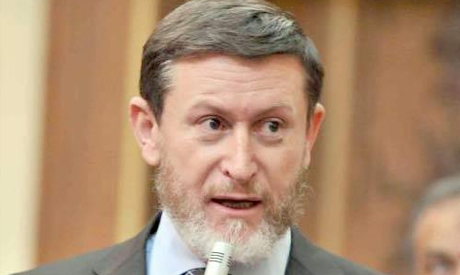
Former MP Farid Ismail (Photo: Al-Ahram)
Egypt’s interior ministry has denied any medical negligence in the death on Wednesday of leading Muslim Brotherhood figure and ex-MP Farid Ismail.
Ismail’s family and lawyers claim that he was denied adequate medical attention in prison, resulting in his death.
Major-General Hassan El-Sohagy, head of the prisons authority at the interior ministry, on Thursday told Ahram Online that these claims were “untrue”. He did not provide further details.
The interior ministry said in a statement on Wednesday that Ismail, 58, died on Wednesday night of liver failure in a Cairo hospital, after being transferred there days earlier from jail. It added that he had received treatment for cirrhosis of the liver and Hepatitis C.
Ismail's funeral took place on Thursday in his hometown of Faqous in the Sharqiya governorate, where people chanted against the government, according to Adel Shaer, a journalist for the Ahram Arabic news website. Security forces were present, but did not enter the village so as to avoid any violence.
After visiting his father in jail, Ismail’s son Mohamed Ismail on Monday published a public statement on Facebook, saying that he had sustained “a clot in the brain” and was unconscious.
“He is currently in a coma,” he wrote. “[There is] clear obstinacy not to move him out of prison to a hospital for the continuous observation and care that he needs.”
Ismail’s lawyer Ismail Abu Baraka told Ahram Online that the prison hospital “was not equipped for the adequate medical care”.
“Only when they thought he was about to die did they decide to transfer him,” he claimed, adding that he was transferred out of prison to a hospital three days before he died.
Farid Ismail was arrested in September 2013 and sentenced to seven years in jail in July 2014 for inciting violence in the Sharqiya governorate, following the ouster of Muslim Brotherhood president Mohamed Morsi in July 2013.
The Egyptian government designated the Brotherhood a “terrorist organisation” in November 2013.
Thousands of the group’s members and alleged supporters, including top leaders, have been arrested and put on trial, mainly over violence charges.
In November last year, Brotherhood leader Tarek El-Ghandour also died in prison after reportedly suffering from internal bleeding.
Several articles in the Egyptian press have recently criticised conditions in Egyptian prisons, while activists and human rights organisations have often condemned the treatment of detainees.
In recent weeks, the general prosecution has inspected several Egyptian prisons.
Short link: